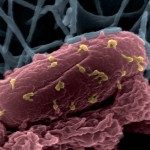Link to Pubmed [PMID] – 40595615
Link to DOI – 10.1038/s41467-025-61268-1
Nat Commun 2025 Jul; 16(1): 5725
The rise of antimicrobial resistance leads to renewed interest in evaluating phage therapy. In murine models highly effective treatment of acute pneumonia caused by Pseudomonas aeruginosa relies on the synergistic antibacterial activity of bacteriophages with neutrophils. Here, we show that depletion of alveolar macrophages (AM) shortens the survival of adult male mice without boosting the P. aeruginosa load in the lungs. Unexpectedly, upon bacteriophage treatment, pulmonary levels of P. aeruginosa are significantly lower in AM-depleted than in immunocompetent mice. To explore potential mechanisms underlying the benefit of AM-depletion in treated mice, we develop a mathematical model of bacteriophage, bacteria, and innate immune system dynamics. Simulations from the model fitted to data suggest that AM reduce bacteriophage density in the lungs. We experimentally confirm that the in vivo decay of bacteriophage is faster in immunocompetent compared to AM-depleted animals and that AM phagocytize therapeutic bacteriophage. These findings demonstrate the involvement of feedback between bacteriophage, bacteria, and the immune system in shaping the outcomes of phage therapy in clinical settings.




